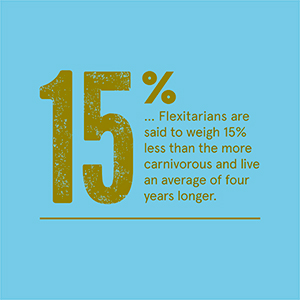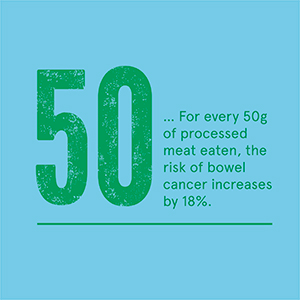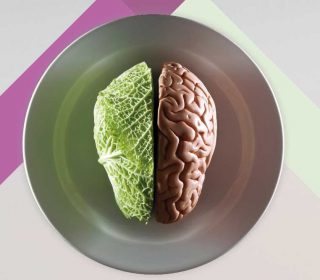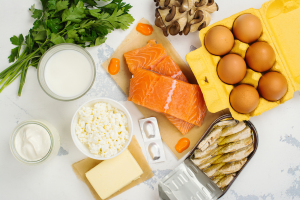Is flexitarianism the new ‘clean eating’?

A recent study found that one in three people now describes themselves as flexitarian, ‘flexible’ vegetarians or ‘vegivores’ who have a plant-based diet but allow themselves an occasional meaty meal. This can also extend to opting for previously niche gluten-free and dairy-free foods when it suits.
In the UK, 40% of the population say they eat less meat than they used to.
‘Today, many of us are eating very differently from the way our parents and grandparents did,’ says leading nutritionist and food writer Fiona Hunter. ‘Back then there was always the idea of having “meat and two veg” but now people are far more accepting of not having any animal produce in their meals.’
As a result, flexitarianism can be a great stepping stone for someone who doesn’t want to go fully vegetarian or vegan but wants to eat less animal produce. ‘Recently experts said we should be eating 10 fruits and vegetables a day, rather than five-a-day, and this is easier to do on a flexitarian diet. Protein replacements like beans are full of fibre, and help fight heart disease and improve digestive health.’
MEAT-FREE BENEFITS
There’s no one reason for this change. ‘For younger people, for instance, giving up meat can be an economical decision because meat is expensive and now there is an increasing awareness and concern over animal welfare’, says Fiona.
‘Another reason for the popularity of flexitarianism is today’s accessibility to a wider range of ingredients that make food for a flexitarian diet quick and easy to produce.’
And, of course, the health benefits of reducing your meat intake are pretty irrefutable. A study carried out by Oxford University found that eating meat no more than three times a week could prevent 31,000 deaths from heart disease, 9,000 deaths from cancer and 5,000 from stroke every year. According to a report from the International Agency for Research on Cancer, for every 50g of processed meat eaten, the risk of bowel cancer increases by 18%.
As a result, World Cancer Research Fund recommends you eat less than 700g – raw weight – of meat a week while processed meat like bacon, chorizo and ham should be avoided completely.
Not to mention, flexitarians are said to weigh 15% less than the more carnivorous and live an average of four years longer.
Many people have long acknowledged the advantages of a more plant-based diet, but they often balked at the idea of giving up their bacon sandwiches or lamb roast for good until the flexibility of being flexitarian set a more achievable goal. The diet concept was helped in no small part by the Meat-free Monday campaign, launched by Paul, Mary and Stella McCartney in 2009 to encourage people to have at least one day without meat every week.
Annabelle Randles, who set up the successful blog The Flexitarian four years ago, now eats meat only once a month after becoming increasingly concerned about the environmental impact of eating red meat. Research has shown that beef production releases five times as much greenhouse gas emissions as other meats and dairy products. But flexitarianism isn’t without its critics.
Dominika Piasecka of The Vegan Society says: ‘It is important to understand that veganism is a set of beliefs and a lifestyle that many are passionate about, rather than simply being a diet. Our vision is a world where animals are free to exist in their own right.’
While the campaign group welcomes the fact that more people are reducing their meat intake, it does not favour a permanent halfway approach.
‘Those who adopt a flexitarian diet clearly care about animals, the environment and their own health,’ says Dominika. ‘We are always delighted to be able to help such individuals to take the next step and eliminate animal products from their lives completely.’
PROTEIN PICKS
While in praise of the concept of flexitarianism, top nutritional therapist and women’s health author Dr Marilyn Glenville also believes ideally we should give up meat totally.
‘Meat is not an easy food to digest and there is more beneficial protein available such as fish and eggs,’ she says.
‘With other animal protein, there are concerns about how they have been bred. If they are corn-fed rather than grass, they are likely to have high levels of omega-6 which creates an inflammatory response in the body.’
Dr Glenville stresses that people should not fall into the trap of believing they eat healthy diets just because they don’t eat meat a number of times a week, particularly when it comes to getting sufficient macronutrients.
‘It is important to keep up protein, whether it is through nut and seeds, quinoa or beans,’ she says.
Dr Marilyn Glenville’s book Natural Solutions for Dementia and Alzheimer’s (£12.77, Lifestyles Press) is out now.
Your 5 steps to flexatarianism
1. Think small
‘Don’t immediately decide that you’re only going to eat meat once a month,’says Annabelle Randles. ‘Just have a meat-free day once a week and build from there when you’re ready. That way you’ll stick to it.’
2. Put meat on the side
‘We are so used to having vegetables as sides but making meat the side instead helps reduce your intake.’
3. Invest in some veggie cookbooks
‘Many people worry that they will get stuck for vegetarian meals but there are lots of easy recipes out there,’ says Annabelle.
4. Sign up to a veg box
‘When you sign up for a vegetable box service, you are guaranteed to get fresh and seasonal produce every week. Since the boxes are usually varied according to what is available, it pushes you out of your comfort zone. They usually come with recipe cards, too.’
5. Up your protein with pulses
‘They replace the protein you would normally be getting from meat but are lower in fat and higher in fibre.’
Read more: Let’s talk about the effects of sugar











